| Construction Rating: | starstarstarstarstar_border |
| Flight Rating: | starstarstarstarstar_border |
| Overall Rating: | starstarstarstarstar_border |
| Diameter: | 0.10 inches |
| Length: | 12.13 inches |
| Manufacturer: | Squirrel Works  |
| Style: | Sport |

Brief:
The Stinger is an easy to build, entry level rocket that actually requires some simple building. The design is
simple, as are construction, prep, flight, and recovery. The result is a nice looking but simple rocket that performs
well.
Construction:
The package was beautiful as is to be expected from Squirrel Works. When opened, all components were present and
consisted of the following:
- Balsa Nose Cone
- Engine Mount Tube
- 1/8" Launch Lug
- Elastic Shock Cord
- Engine Hook
- Streamer
- Engine Block
- Screw Eye
- 2 Adapter Rings (Engine Tube to Body Tube)
- Body Tube
- Balsa Fin Sheet
- Tape Strip
- Decal Sheet
- Instruction Sheet

All components seemed to be of good quality, but there was no Kevlar®. I have learned from bitter experience now that if I do not add any, the life of the rocket will be short.
The instructions were printed on both sides of a single, legal sized sheet and presented in tri-fold fashion. They were easy to follow and adequately illustrated.
Construction began with the building of the motor mount. An engine block is glued into one end. The provided engine block was a very loose fit. I gave it a few extra applications of glue to make sure it stays put. After gluing in the engine block, a slit was made to accommodate the engine hook. It is held in place with a piece of masking take and the adapter rings are glued in place one half inch from either end. In contrast to the engine block which was very loose, the adapter rings were very tight and needed significant sanding to fit around the engine tube. At this stage, I tied a 14" length of Kevlar® around the engine tube and threaded it through one of the adapter tubes. The entire engine assembly is then glued in place in the body tube in the standard fashion.
The fins were easily removed from the laser cut balsa sheet and the quality of the laser cutting was first rate. The instructions said to round the leading and trailing edges but indicated that that the outer edges should be left square. I guess that fits well with the visual design of this rocket. The first 2 fins sanded easily but the third one snapped as I was trying to round the leading edge. I repaired the damaged with some CA and the result was visually indistinguishable from the other two.
The instruction provide a wraparound marking guide for the fins. I did not use it. Instead, I used an Art Rose jig which defaults to a 3FNC configuration. So it was then that I popped the body onto the jig and then proceeded to affix the fins with CA. After a few minutes, I filleted the joints with carpenter's glue and affixed the launch lug.
The remaining assembly steps were short. I screwed an eye into the balsa nose cone, tied the provided elastic shock cord to my previously installed Kevlar® and tied the elastic to the nose cone. I prefer to put the recovery device (mylar streamer) in place when at the field ready to fly.
PROs: Good instructions. Logical construction order.
CONs: Very loose engine block. Very tight adapter rings. No Kevlar®.
Finishing:
Prepping the Stinger for finishing was easy. A single coat of Elmer's Fill 'n' Finish did the trick for both the nose
cone and the fins. The spirals on the body tube were tight enough that I didn't bother with them. A coat of white
Krylon spray paint was used as a primer and then the entire rocket was sprayed yellow. I applied 2 coats of the yellow
and then masked the upper body above the launch lug and the fin opposite the launch lug for painting black. Two coats
of black were applied and the masking was removed. I was disappointed. I knew it was a simple scheme but this just
didn't look very good to me. It was too plain. That changed with the addition of the decals.
Each side of the yellow fin got a decal of a bee. That helped a little bit but it was the ring decal that really made all the difference to me. The ring decal consists of several parallel black lines of diminishing thickness that wrap around the body tube circumferentially. They blend well with the black body below and make the model look sharp. All that was left was to apply the decal saying "Stinger" on the upper body. This simple rocket was now looking good and needed only some clear coat to complete it.
PROs: Very simple. Looks Good with simple paint scheme.
CONs: none.
Construction Rating: 4 out of 5
Flight:
Recommended Motors: 1/2A6-2, A6-4, A8-5, B6-6, C6-7
I started off small with an Estes 1/2A6-2. The motor was a little snug but there were no real problems. In place of wadding, I used some dog barf and inserted the rolled up streamer. I set the rocket on the pad, hooked her up and fired her off.
As to be expected, I achieved no phenomenal altitude with a 1/2A, but the rocket boost straight. Ejection took place at apogee and the rocket started down under the streamer. Everything looked fine until I realized that it was going to land on the hood of my Excursion. It bounced nicely and the snapping of the fins really helps to absorb the energy of impact. Needless to say, that was the last flight for this rocket on this day but it will fly again.
Recovery:
The automobile collision avoidance radar did not work properly. Other than that, everything seemed to work fine.
Flight Rating: 4 out of 5
Summary:
PROs: Easy, sporty, and good looking.
CONs: Does not handle impacts with large SUVs well.
Overall Rating: 4 out of 5
 |
 |
Flights
 |
 |